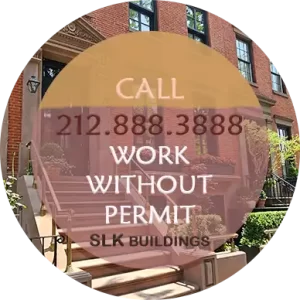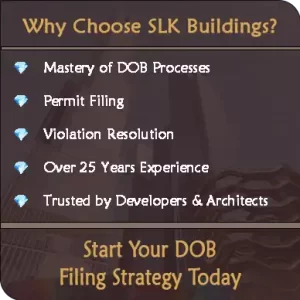NYC Work Without Permit Violation: Consequences & Fines Explained
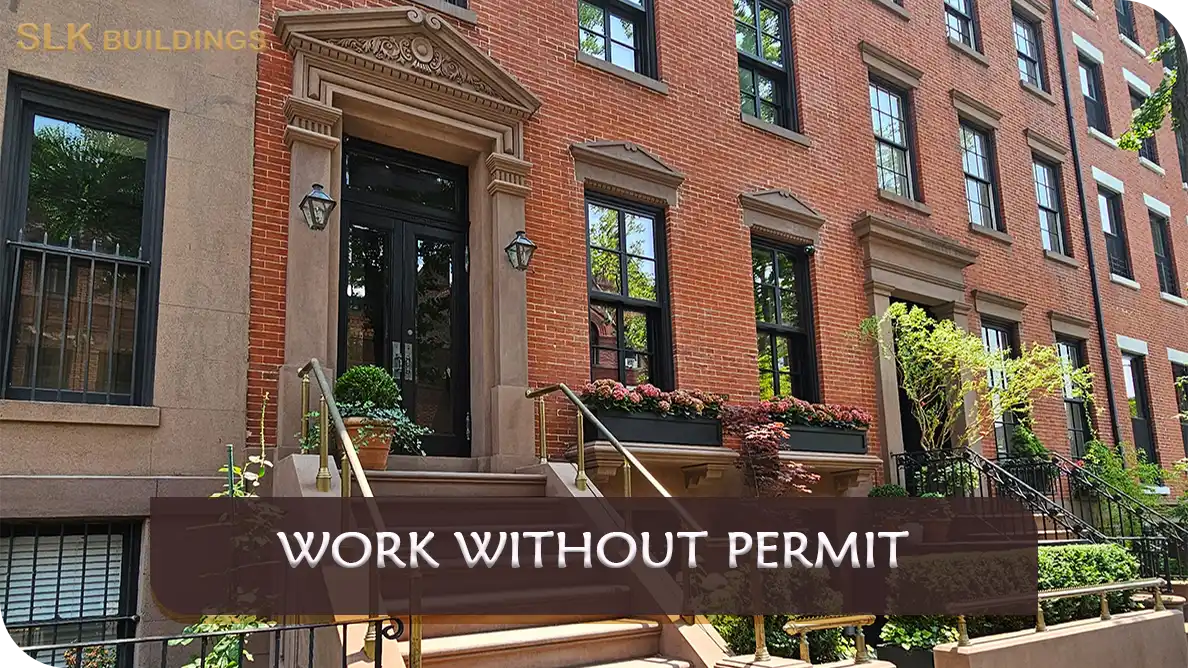
Updated: August 8, 2025
Facing Work Without Permit Fines or a Stop Work Order? SLK Buildings Can Resolve It
Updated September 2025 to reflect current NYC DOB enforcement and new ADU application pathways under NYC’s City of Yes housing plan.
If you’ve been issued a violation for doing construction without a permit in New York City—whether in Queens, Brooklyn, Manhattan, or the Bronx—you’re not alone. Every year, thousands of NYC homeowners, landlords, and developers find themselves hit with fines, Stop Work Orders, or even court summonses for unpermitted work.
At SLK Buildings, we help you fix it fast. From retroactive permits to ECB hearings, we guide you through every step—so you don’t risk escalating penalties or permanent violations on your property record.
Build Smart. Don’t Let One Mistake Cost You Thousands.
Free ConsultationFrom Brooklyn Brownstones to Manhattan Lofts—We’ve Seen It All.
Speak to an ExpertWhy NYC Property Owners Can’t Afford to Ignore Work Without Permit Violations
Working without a permit in New York City is a serious breach of building regulations and can lead to significant consequences for property owners, contractors, and workers alike. Here’s a detailed look at what constitutes a work without permit violation in NYC and its implications.
“As of September 2025, NYC now accepts applications for legal Accessory Dwelling Units (ADUs) — including attic, basement, and backyard conversions. Learn how this program may also help resolve certain prior violations by visiting our ADU landing page.”
Got a Work Without Permit Violation in Brooklyn or Queens? Avoid penalties — SLK Buildings Violation Experts can help. Request a Free Consultation Today
At SLK Buildings, we don’t just offer services — we empower property owners with clear, actionable knowledge. We explain exactly what needs to be done to comply with NYC regulations. But if you're unsure, overwhelmed, or just want it handled properly, we're here to take care of it for you.
What is a Work Without Permit Violation in NYC?
Working without a permit refers to engaging in any construction, renovation, alteration, or demolition work without obtaining the necessary permits from the New York City Department of Buildings (DOB). This includes both residential and commercial properties.
Which Renovations in NYC Require Permits? (More Than You Think)
In NYC, a wide range of construction activities necessitates permits, including structural modifications, plumbing, electrical work, mechanical installations, and even minor alterations such as adding or removing walls.
Note: Some basement and attic projects may now qualify for legalization through NYC’s new ADU program.
See our update: NYC Opens ADU Applications.
For larger renovations, confirm requirements first: How to Obtain a Permit in NYC.
🔎 Explore the Full Guide to NYC DOB Stop Work Orders:
💎 What Is a Stop Work Order
💎 Basis of Stop Work Order Issuance
💎 NYC DOB Stop Work Order Violations
💎 Full Stop Work Order
💎 Partial Stop Work Order
💎 Stop Work Order Guide
💎 Top Mistakes That Trigger SWOs
💎 What Happens If I Get a Stop Work Order
💎 What Happens When a Stop Work Order Is Issued
💎 How Long Does a Stop Work Order Last?
💎 The Real Cost of Getting Caught Without a Permit
💎 Stop Work Order Issued for Work Without Permit
💎 Work Without Permit
💎 Work Without Permit Violations
💎 Plumbing Work Without Permit Violation
💎 Electrical Work Without Permit Violation
💎 Civil Penalty Increased for Work Without Permit
💎 Why NYC Property Owners Can’t Afford to Ignore Work Without Permit
💎 How to Get a Permit When Work Is Done
💎 Violating a Stop Work Order
🚨 What is a Stop Work Order
1. Civil Penalties and Fines:
- Penalties vary by dwelling type.
- One-family or two-family dwelling: Greater of six times the permit fee or $600, up to $10,000 maximum.
- Other buildings: Greater of 21 times the permit fee or $6,000, up to $15,000 maximum.
- Civil penalties must be resolved before a permit will be issued for unpermitted work.
2. Potential Demolition or Alteration:
- The NYC Department of Buildings (DOB) can require removal or alteration of unpermitted work.
- This process can be costly and significantly delay your project.
3. Impact on Homeowner’s Insurance:
- Unpermitted work can void your insurance coverage.
- Insurers may refuse to cover damages caused by unauthorized construction, such as fires from faulty wiring.
- Your policy may be cancelled if unpermitted work is discovered.
4. Difficulty Selling or Refinancing:
- Unpermitted work can reduce property value and complicate sales or refinancing.
- Buyers and lenders often require all work to be permitted and code-compliant.
- Sellers are legally required to disclose unpermitted renovations.
5. Safety Concerns:
- Permits ensure work meets building codes and safety standards.
- Unpermitted work can create unsafe conditions, risking injury or worse.
- Improper plumbing or electrical work can be especially hazardous.
In summary: Skipping permits might seem like a shortcut, but the risks — financial, legal, and safety — far outweigh any perceived benefits. Following proper DOB procedures protects your investment and ensures compliance.
The Real Cost of Getting Caught in NYC Without a Permit
The consequences of working without a permit can be severe. Firstly, the DOB has the authority to issue a Stop Work Order, immediately halting all construction activities until the required permits are obtained. Additionally, hefty fines can be imposed, often ranging from hundreds to thousands of dollars per day, depending on the scale and nature of the violation. Repeat offenders may face escalated penalties, including criminal charges.
NYC DOB Fine Schedule: What You Could Pay
The fines for working without a permit in New York City can vary depending on several factors, including the nature and scope of the violation, the type of property involved, and whether it’s a first-time offense or a repeat violation. However, fines for working without a permit can range from hundreds to thousands of dollars per day.
Civil Penalties Structure:
Beginning June 18, 2018, NYC DOB has increased the civil penalties for work without a permit per Local Law 156 of 2017.
- For a single- or two-family residence, the civil fine for undertaking work without a permit is elevated to six times the permit fee, with a raised minimum of $600 and a maximum of $10,000.
- For structures other than single- or two-family homes, the civil fine for conducting work without a permit is raised to 21 times the permit fee, with a minimum penalty of $6,000 and a maximum of $15,000.
- The initial offense under a Stop Work Order incurs a fine of $2,000.
- Second violation of a SWO is an additional $5,000
- For any further breach of a Stop Work Order, there is an additional $10,000 fine.
Update – September 2025: NYC now allows homeowners to apply for legal
Accessory Dwelling Units (ADUs).
This creates a potential pathway to legalize certain basements and attics that were previously cited as unpermitted work, provided all code and safety requirements are met.
🚧 Seeking Professional Guidance on Work Without Permit
Given the intricacies of New York City’s Department of Buildings regulations, property owners should seek qualified assistance when facing a Stop Work Order (SWO). The right guidance can mean the difference between weeks of delay and a swift resolution.
At SLK Buildings, we’ve spent over 25 years helping NYC homeowners, developers, and business owners navigate DOB requirements, file the right paperwork, and remove violations efficiently. Our team understands both the legal framework and the practical steps needed to lift a Stop Work Order — from site inspections and permit filings to coordination with licensed professionals and city agencies.
Whether you’re dealing with an emergency shutdown or a complex project suspension, SLK Buildings provides clear strategies to restore compliance, reduce penalties, and get your project moving again.
Enforcement by the ECB: What NYC Owners Must Know
Any individual found in violation or non-compliance with laws enforced by the Department or any associated orders may face civil penalties, recoverable through proceedings before the Environmental Control Board (“ECB”). These proceedings begin with the service of a Notice of Violation (“NOV”), which is presented before the board.
- Immediately Hazardous Violation: Violations deemed immediately hazardous are determined either by the New York City Construction Codes or by conditions that present a severe threat to life, health, safety, property, public interest, or a significant number of individuals, necessitating prompt corrective measures. This classification also applies to outdoor advertising violations where penalties serve as a deterrent against the perpetuation or recurrence of the violation. Such immediately hazardous violations are categorized as Class 1 violations.
- Major Violation: Significant violations are those delineated by the New York City Construction Codes or those where the violation impacts life, health, safety, property, or public interest, although immediate corrective measures are not necessary. In the context of outdoor advertising, such violations and their penalties serve as an economic deterrent against the continuation or recurrence of the violation. These significant violations are classified as Class 2 violations.
- Lesser Violation: Lesser violations are characterized by their lesser impact compared to immediately hazardous (Class 1) or major (Class 2) violations on life, health, safety, property, or public interest. These lesser violations are classified as Class 3 violations.
- Cure: Admitting to a violation through a cure eliminates the necessity for a hearing at ECB, serves as a basis for subsequent violations, and, in accordance with Section 28-204.2 and the Buildings Penalty Schedule, incurs no penalty.
- Stipulation: A stipulation, whether it’s a pre-hearing or a hearing stipulation, grants the respondent seventy-five days from the initial scheduled hearing date to rectify the violation and submit a certificate of correction. Failure to do so will result in any reduced penalty associated with a pre-hearing stipulation being adjusted to the standard hearing penalty outlined in the Buildings Penalty Schedule. Approval by the ECB is required for a stipulation to be effective.
- Mitigation: A violation eligible for mitigation may undergo a reduction in penalty if, during the hearing, the respondent demonstrates that the issue was resolved prior to the first scheduled hearing date at ECB. In the event of a mitigated penalty, the amount will be half of what would have been imposed during a hearing for that specific violation. Following this, a valid certificate of correction must be submitted to the Department. However, violations categorized as Aggravated I or Aggravated II are never eligible for mitigation, regardless of any indication in the “Mitigation” column of the Buildings Penalty Schedule for that violation.
Many NYC property owners ask us the same questions when facing a Work Without Permit violation.
Below are the most common answers to help you understand your options before penalties escalate.
Frequently Asked Questions about Work Without Permit in NYC
What happens if you work without a permit in NYC?
Working without a permit can result in Stop Work Orders, fines up to 21 times the permit fee, additional penalties of $10,000 or more, and possible legal or insurance issues.
Does NYC allow homeowners to legalize basement or attic apartments in 2025?
Yes. As of September 2025, under the City of Yes housing plan, NYC allows legal Accessory Dwelling Units (ADUs), including attic, basement, and backyard conversions.
Can working without a permit affect property sales?
Yes. Unpermitted work must be disclosed during property transactions and can delay closings, complicate financing, or reduce property value.
Violation Classes & Penalties: Class 1, 2, and 3
Violation Classes:
💎 Class 1 Violations
💎 Class 2 Violations
💎 Class 3 Violations
Legal Trouble & Liability: How Unpermitted Work Can Backfire
Beyond financial penalties, there are legal and safety ramifications associated with working without permits. Unpermitted work poses significant safety risks to workers, occupants, and neighboring properties. Moreover, in the event of accidents or injuries on the job site, liability issues can arise, and insurance coverage may be invalidated if the work was done without proper permits and inspections.
How to Fix a Work Without Permit Violation in NYC
If caught working without a permit, it’s imperative to rectify the situation promptly. This typically involves halting all work, applying for the necessary permits, and addressing any code violations identified by the DOB. Depending on the severity of the violation, additional steps such as hiring licensed professionals to oversee the project or making structural corrections may be required.
How to Avoid Work Without Permit Fines: Pro Tips
The most effective way to avoid work without permit violations is to ensure compliance with NYC’s building codes and regulations from the outset. Property owners and contractors should familiarize themselves with the permitting requirements for their specific projects and obtain the necessary permits before commencing any work. Working with licensed professionals who understand local building codes can help ensure compliance and mitigate the risk of violations.
In summary, working without a permit in New York City carries significant consequences, including financial penalties, legal liabilities, and safety risks. Property owners and contractors must prioritize compliance with building regulations to safeguard the integrity of construction projects and the well-being of all involved parties.
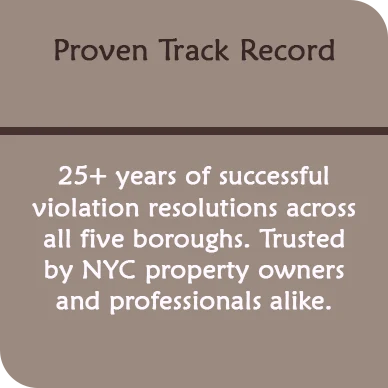
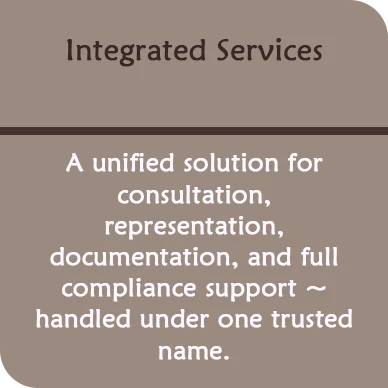
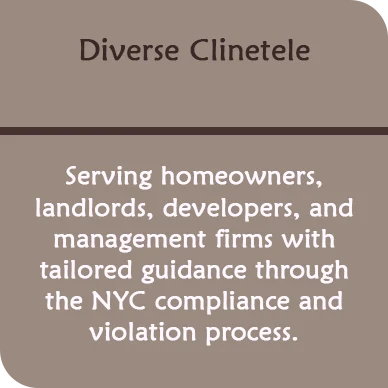

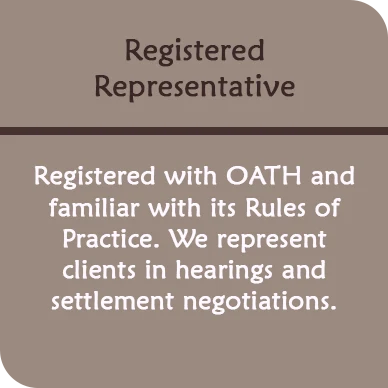
SLK Buildings assists Home Owners in dealing with Work Without Permit Violations
- “From Brooklyn brownstones to Queens condos…”
- “Many co-op boards on the Upper West Side face Stop Work Orders due to minor renovations without filings.”
- “We’ve helped contractors in the Bronx legalize unpermitted plumbing and electrical jobs.”
- “SLK Buildings works across Manhattan, Staten Island, and beyond.”
- “Property owners in Forest Hills, Bay Ridge, and Harlem trust our permit consulting services.”
SLK Buildings provides free educational content to help property owners understand their options.
For those who prefer professional assistance, we’re available to manage the process on your behalf.
“Updated September 2025 – Includes new ADU application pathways under NYC’s City of Yes housing plan.”
“NYC now allows homeowners to apply for legal ADUs, which may provide a path to resolve basement and attic violations.”

